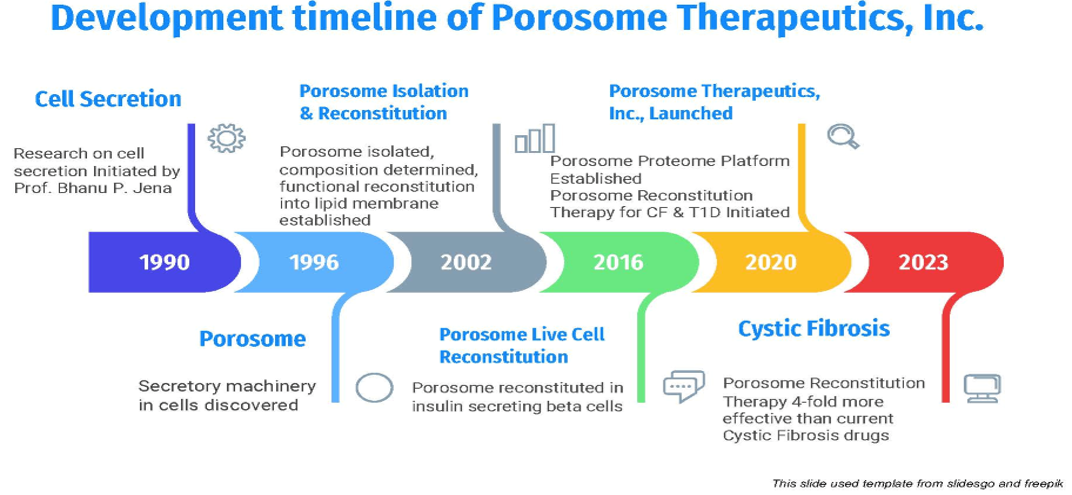Discovery Underlying Porosome Therapeutics, Inc. Continues to Receive Global Recognition

FOR IMMEDIATE RELEASE: January 25, 2024
CONTACT: Kaitlin Perry, kaitlin@perrycom.com (916) 834-1300
Discovery Underlying Porosome Therapeutics, Inc. Continues to Receive Global Recognition
The company’s therapeutic platform leverages more than 30 years of deep science and $150 million in investments.
January 25, 2024 (BOSTON) – Porosome Therapeutics, Inc. (Porosome Therapeutics) today announced that its Academic Chairman and Co-Founder, Professor Bhanu P. Jena, PhD, will be recognized with the 2024 Camurus Lipid Science Prize. Prof. Jena is being honored with the award for discovering the porosome, the universal secretory machinery in cells. Among previous recipients of this prestigious prize is the 2021/2022 co-recipient Dr. Katalin Kariko, who then went on to receive the 2023 Nobel Prize in Physiology or Medicine. Following Prof. Jena’s discovery in 1990, Porosome Therapeutics translated nearly three decades of basic research by developing the company’s breakthrough platform, which was recently found to be several times more effective than existing drugs in treating cystic fibrosis.
“I’m honored to be selected to receive the 2024 Camurus ‘Lipid Science Prize’ for discovery of the porosome. It is humbling and immensely gratifying to see how basic research leading to the discovery of the porosome and its molecular underpinnings is now being translated to help treat a wide range of debilitating diseases. I am grateful to the Porosome Therapeutics team and our investors for aiding in the company’s ability to harness and translate the porosome discovery for powerful therapeutic applications,” said Prof. Jena. “Secretory disorders, like cystic fibrosis, diabetes, and Alzheimer’s can now be better understood and treated.”
Prof. Jena’s groundbreaking discovery has advanced biopharmaceutical research and will soon transform the way we treat cystic fibrosis, diabetes, cancer, Alzheimer’s, and certain neurological, digestive, and immune disorders. Since the time of the initial discovery, and guided by leading scientists in advanced laboratories, more than $150 million has been invested into the related research with more than 200 peer-reviewed scientific papers and six books published, enabling the company’s R&D initiative to translate these findings to generate unprecedented results and thus advance drug discovery and therapy. Porosome Therapeutic’s breakthrough platform of reprogramming the cell’s secretory machinery has been compared to gene editing and mRNA in terms of the fundamental paradigm shift it has introduced in therapeutics.
“This is only the tip of the iceberg – this timeline reflects a lifetime of dedication to advancing our understanding of cellular structure function, so that the company could advance and develop novel treatments for currently incurable diseases, creating hope where previously there was none,” said Guillermo Marmol, Co-Founder and CEO, Porosome Therapeutics. “The potential of the porosome has many unutilized resources, including addressing undruggable targets. Our company research will continue to inspire investors and scientists with the numerous possibilities it opens up.”
Porosome Therapeutics is a name to remember in the drug discovery biopharmaceutical space. Not only because the company was the first to patent the use of the porosome discovery for therapies, but also because the company was the first to utilize the reprogramming of the cell’s secretory machinery to treat debilitating diseases. This commitment, and the dedicated focus of the company in developing the porosome platform, has led to the International Patent Searching Authority declaring the company’s approach to be “novel” and “inventive.”

About Porosome Therapeutics, Inc.
Porosome Therapeutics, Inc. is a Boston-based biopharmaceutical company utilizing breakthrough discovery and novel technologies to identify and create proprietary high-value therapeutics for currently undruggable porosome proteins and lipid targets relating to secretory disorders such as cystic fibrosis, diabetes, Alzheimer’s, and cancer.